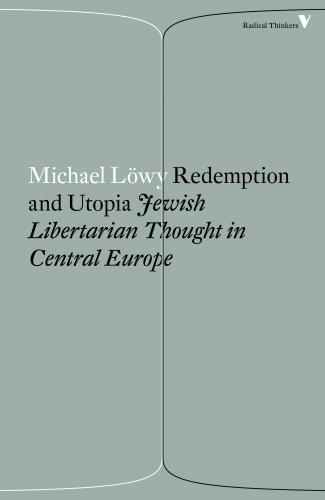REDEMPTION
AND UTOPIA
Jewish Libertarian Thought
in Central Europe
A Study in Elective Affinity
MICHAEL LÖWY
Translated by Hope Heaney
This edition published by Verso 2017
English-language edition first published by The Athlone Press 1992
First published in French as Rédemption et Utopie: Le judaïsme libertaire enEurope centrale
© Presses Universitaires de France 1988
Translation © Hope Heaney 1992, 2017
All rights reserved
The moral rights of the authors have been asserted
1 3 5 7 9 10 8 6 4 2
Verso
UK: 6 Meard Street, London W1F 0EG
US: 20 Jay Street, Suite 1010, Brooklyn, NY 11201
Verso is the imprint of New Left Books
ISBN-13: 978-1-78663-085-8
ISBN-13: 978-1-78663-086-5 (UK EBK)
ISBN-13: 978-1-78663-087-2 (US EBK)
British Library Cataloguing in Publication Data
A catalogue record for this book is available from the British Library
Library of Congress Cataloging-in-Publication Data
A catalog record for this book is available from the Library of Congress
Printed in the US by Maple Press
Contents
Introduction: The Defeated of History
1On the Concept of Elective Affinity
2Jewish Messianism and Libertarian Utopia: From ‘Correspondences’ to ‘Attractio Electiva’
3Pariahs, Rebels and Romantics: A Sociological Analysis of the Central European Jewish Intelligentsia
4Religious Jews Tending to Anarchism: Martin Buber, Franz Rosenzweig, Gershom Scholem, Leo Löwenthal
5‘Theologia negativa’ and ‘Utopia negativa’: Franz Kafka
6Outside all Currents, at the Crossing of the Ways: Walter Benjamin
7The Religious-Atheist and Libertarian Assimilated Jews: Gustav Landauer, Ernst Bloch, Georg Lukács, Erich Fromm
8Crossroads, Circles and Figures: A Few Examples
9A French Exception: Bernard Lazare
Conclusion: ‘Historical Messianism’: A Romantic/Messianic Conception of History
Notes
Bibliography
Index
Introduction:The Defeated of History
Our generation has learnt the hard way that the only image we shall leave is that of a vanquished generation. That will be our legacy to those who follow.
Walter Benjamin
Thesis XII, from On the Philosophy of History, 1940
The term ‘Central Europe’ or Mitteleuropa refers to a geographical, cultural and historical area united by German culture – that of Germany and the Austro-Hungarian Empire. From the middle of the nineteenth century up to 1933, the culture of the Central European Jewish community blossomed in the most extraordinary way, experiencing a Golden Age comparable to that of the Judeo-Arab community in twelfth-century Spain. It was the product of a spiritual synthesis unique in its kind, which gave the world Heine and Marx, Freud and Kafka, Ernst Bloch and Walter Benjamin. Today this German-Jewish culture seems like a vanished world, a continent erased from history, an Atlantis engulfed by the ocean, along with its palaces, temples and monuments. It was destroyed by the Nazi tide, surviving only in scattered pockets or in exile, and its last representatives – Marcuse, Fromm and Bloch – have now passed away, like the final embers of a huge spiritual fire. It did, however, leave its mark on twentieth-century culture, in its richest and most innovative accomplishments in the sciences, literature and philosophy.
This book studies a generation as well as a particular current within the Jewish cultural universe of Mitteleuropa: a generation of intellectuals born during the last quarter of the nineteenth century, whose writings were inspired by both German (romantic) and Jewish (messianic) sources. Their thinking was profoundly, ‘organically’ and inseparably Judeo-Germanic, whether they accepted this syncretism with pride (Gustav Landauer) or with wrenching pain (Franz Kafka), whether they tried to deny their German sources (Gershom Scholem) or their Jewish identity (Georg Lukács). Their thinking took shape around the Jewish (cabbalistic) idea of Tikkun, a polysemic term for redemption (Erlösung), restoration, reparation, reformation and the recovery of lost harmony.
Theirs was a generation of dreamers and utopians: they aspired to a radically other world, to the kingdom of God on earth, to a kingdom of the spirit, a kingdom of freedom, a kingdom of peace. An egalitarian community, libertarian socialism, anti-authoritarian rebellion and a permanent revolution of the spirit were their ideals. Several fell like lonely soldiers in a twentieth-century Thermopylae, victims of a barbarism that was either still budding (Gustav Landauer, Munich 1919) or already triumphant (Walter Benjamin, Port-Bou 1940). For the most part, they were unarmed prophets. One episode from the life of Georg Lukács could apply to many of them. Following the defeat of the Hungarian revolution in November 1956 (in which he had participated as Minister of Culture in the Imre Nagy government), Lukács found himself under arrest. A Soviet officer, brandishing his machine gun, ordered: ‘Hand over your weapons immediately!’ Not having any choice, the old Jewish-Hungarian philosopher took his pen from his pocket and handed it over to the forces of order.
Their generation were the defeated of history. It is not surprising that so many of them chose suicide: Tucholsky, Toller, Wolfenstein, Carl Einstein, Hasenclever, Benjamin.
In his Theses on the Philosophy of History, Walter Benjamin insisted that history be written from the point of view of the defeated. This book tries to apply that method.
Through a paradox that is more apparent than real, it is precisely because they were the defeated, because they were outsiders going against the tide of their era, and because they were obstinate romantics and incurable utopians, that, as we approach the end of the twentieth century, their work is becoming increasingly relevant and meaningful.
It goes without saying that the romantic and messianic generation contained the most diverse and contradictory political and ideological currents. The aim of this book is not to resolve its debates or to take a stand in the controversies, but rather to understand the overall movement, its genesis in Central Europe at an historical and social conjuncture of crisis and renewal for both the Jewish tradition and German culture. Written within the framework of the sociology of culture, it analyses the development of a new social category, the Jewish intelligentsia, and the conditions that favoured the dawning
